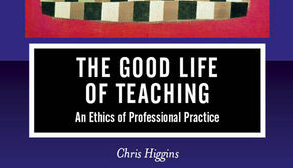This book is a deep dive into how teaching can contribute to the good life of a teacher, and not just his or her students. It is also one of the texts we will be tackling in the Character and Virtue PLC this term.
Christopher Higgins of the University of Illinois, Urbana-Champaign is a philosopher of education and it shows in this book. He starts by giving a short history of why some philosophers believe modern ethical theories don’t make enough room for the individual projects of people living meaningful lives and then sets his sights on applying these insights to teaching — particularly in higher education. Along the way he gives a good explanation of virtue ethics and expands on the vital role of a word that we use a lot in CELT: a practice. Practices are activities that we undertake, socially, that have a kind of built-in reward for those who work on improving their participation in the practice. Teaching, he argues, is an important practice and thus must be understood as something more than selfless devotion to the good of one’s students.
There is a lot of philosophy here, but the book is also a good foundation for understanding why burn-out is so common among faculty in higher education and what kind of steps one can take in one’s own teaching practice to rediscover some of the joys that attracted us to teaching in the first place.


